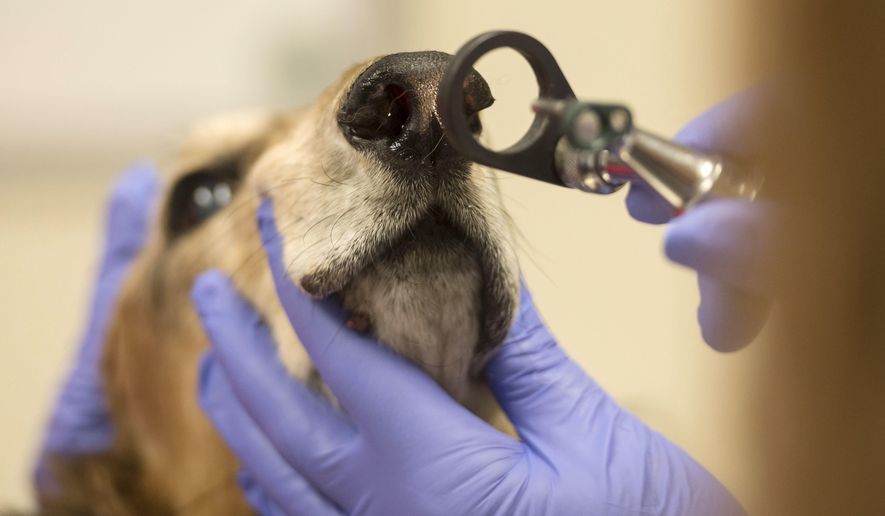Animal rights advocates are demanding that the Food and Drug Administration end testing on dogs in drug development protocols and create a pathway for animal-free research methods.
More than 60,000 dogs in about 350 labs in the U.S. are used for testing and research, most commonly for products such as drugs, pesticides and medical devices, according to the Humane Society of the United States.
At a panel discussion Tuesday at the Longworth House Office Building, Kathleen Conlee, the Humane Society’s vice president of animal research issues, said animals generally are poor predictors of human safety and suffer and undergo unnecessary tests.
“I think people care about human health and animals, and we don’t have to choose one or the other,” Ms. Conlee said. “We shouldn’t be relying on animals and should instead be using more human-relevant approaches.”
She said more than 90% of drugs tested on animals ultimately fail in human trials.
“Now the technologies have been so incredibly developed. In moving forward, we’re focusing on replacement. Let’s move away from using animals altogether,” Ms. Conlee said.
New drugs must undergo a nonclinical developmental phase, which often involves animal testing, in order to win FDA approval.
Elizabeth Baker, pharmaceutical policy program director for the Physicians Committee for Responsible Medicine, said many of the animal tests used today were developed in the 1960s, before modern scientific advances emerged. She said many tests are driven largely by antiquated policies.
The federal Animal Welfare Act of 1966 regulates the housing and transportation of research animals but not experiments conducted on them, according to the education nonprofit ProCon.org. The law does require that each research facility create a three-member committee focused on the care and use of its animals.
Several agencies have announced plans to reduce animal testing. The Environmental Protection Agency said last month that it will phase out animal testing by 2035. Earlier this year, the Department of Agriculture said it would stop using cats and kittens in research experiments.
But animal rights advocates say big changes in drug development and animal testing will not happen unless FDA guidelines change.
Last November, then-FDA Commissioner Scott Gottlieb said the agency supports decreasing animal testing.
“The U.S. Food and Drug Administration is committed to animal welfare in research by reducing, replacing and/or refining the use of animals in research whenever possible,” said Dr. Gottlieb, pointing to a study that could offer a way for drug developers to conduct certain types of research without using dogs.
The study involves a small number of dogs who would be subject to “minimally invasive blood sampling” and adopted as pets at the completion of a short trial. This would eliminate the need to use dogs in specific types of studies, some in which the dogs otherwise might be euthanized.
However, the FDA said animal testing is still necessary in many areas.
“Non-animal testing is not yet a scientifically valid and available option,” the agency says on its website.
Ms. Conlee of the Humane Society said the FDA is the authority on animal testing. She said Congress could pressure the agency and drug companies could refuse to follow its animal testing protocols.
A drug company that is resisting the FDA guidelines on animal research is Vanda Pharmaceuticals. The company declined to conduct a non-rodent toxicity study, which typically uses beagle puppies, to test a drug that already had cleared in humans, said A.J. Jones II, Vanda’s chief corporate affairs and communications officer.
“The animal studies the FDA demands, including the nine-month, non-rodent toxicity study, have been considered routine in the pharmaceutical industry for decades, despite the growing body of evidence discrediting such studies’ scientific value,” Vanda said in an open letter to the FDA. “For this reason, drug companies typically conduct the studies reflexively, without challenging the FDA.”
“The FDA has relied on industry complacency for too long,” the letter reads.
Vanda filed a complaint against the FDA in February to ask a court to lift a partial clinical hold that the agency imposed to prohibit the company from studying the new drug in humans for more than 12 weeks without conducting animal studies.
The FDA says animals sometimes are used to test drugs, vaccines and other biologics and medical devices mainly to determine the products’ safety. For drugs and biologics, animal testing is used to study the drug’s nature, chemistry, effects and potential harm to the body.
For medical devices, the focus of animal testing is on the device’s ability to work with living tissue without harming the tissue. But most devices use materials such as ceramic or stainless steel that are not compatible with human tissues and don’t require animal testing.
• Shen Wu Tan can be reached at stan@washingtontimes.com.




Please read our comment policy before commenting.